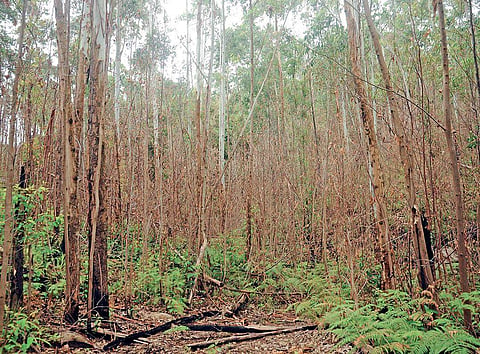

BENGALURU: If the principle aim of National Forest Policy, 1988, was environmental stability and maintaining ecological balance, the new draft policy moots public-private participation in afforestation programmes and allowing private plantations in degraded natural forests. If approved, the policy will fulfil the long standing demands of timber and forest-based industry to allow private the sector to grow, harvest and sell timber grown on natural forest lands.
Incorporating major policy shifts, the NFP, 2018, focuses on afforestation in degraded lands through PPP models. According to the document, degraded lands means ‘lands with less than 40 per cent canopy density’. Further, it seeks to promote industrial plantations in forest lands.The draft policy outlines, “The lands available with the State Forest Development Corporations which are degraded and underutilised will be managed for production of ‘quality timber’ with scientific interventions. PPP models will be developed for undertaking afforestation and reforestation activities in degraded forest areas and forest areas available with Forest Development Corporations and outside forests.”
However, the NFP, 2018, in the background of India’s participation in various global summits, has come out with climate change mitigation and adaptation measures through sustainable forest management. To address the issue of climate change, NFP says, “Climate change mitigation and adaptation measures in forest management through the mechanism of REDD+ (Reducing Emissions from Deforestation and Forest Degradation plus) will be taken up so that the impacts of climate change is minimised.”
But on the issue of Forest Rights Act, the draft policy is pretty vague and has hardly anything to say. It just says, “As far as community forest resources management under FRA is concerned, the new policy will address the same under participatory forest management and the same will be addressed through the proposed community forest management mission.”
On the lines of the national and state wildlife boards, for forest administration and management too, the draft policy advocates a National Board of Forestry headed by Union forest Minister and State Boards of Forestry headed by state forest ministers will be established for ensuring inter-sectoral convergence, simplification of procedures, conflict resolution and periodic review. It says, “Forest Skill Development centres will also be set up with the help of National Skill Development Corporation for forest-based industries so that a demand for trained professionals is created in this sector.”
Criticising the sweeping changes, environmentalists say, “The draft policy claims despite ‘increase in forest and tree cover’ and reduction in the diversion of forest land for commercial activities, the quality and productivity of our natural forests is pretty low and so there is an urgent need to revise the National Forest Policy after three decades to tackle new and newer challenges. This is nothing but pandering to the demands of the timber industry even while ignoring the rights of the tribal communities and other forest dwellers. If this policy is approved, then forest lands traditionally used by forest dwellers will be opened up and leased to private industries, thereby, violating the FRA.”
CALL FOR PUBLIC COMMENTS
The Draft National Forest Policy, 2018, has called for suggestions, comments, and views of stakeholders including private/public organisations, experts and concerned citizens. The comments should be sent by April 14 to digfpolicymef@nic.in or jitesh.kumar@nic.in. They can also be sent to toforestpolicy@gmail.com